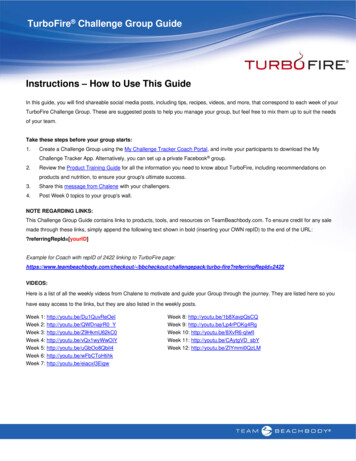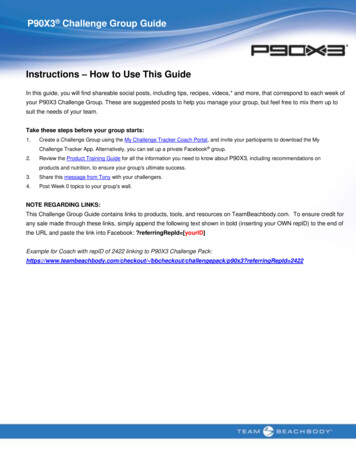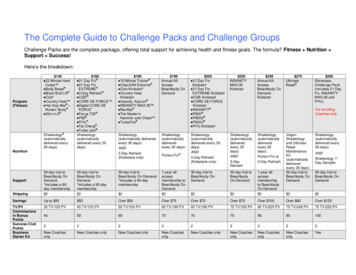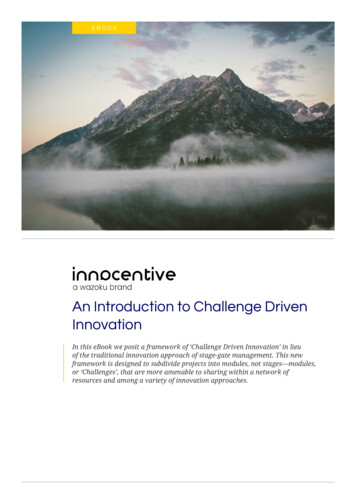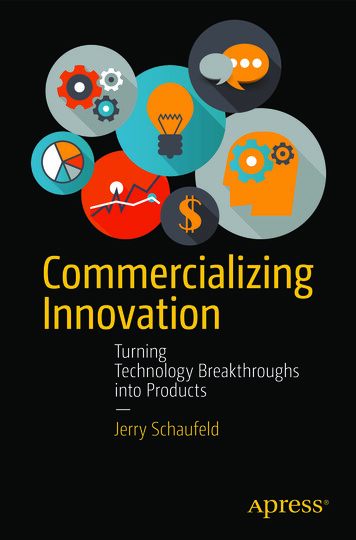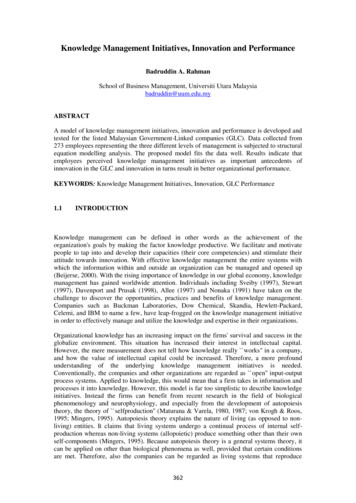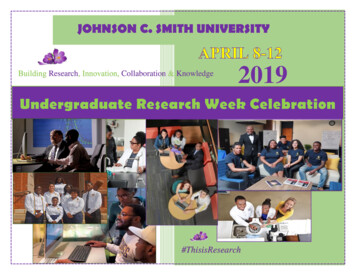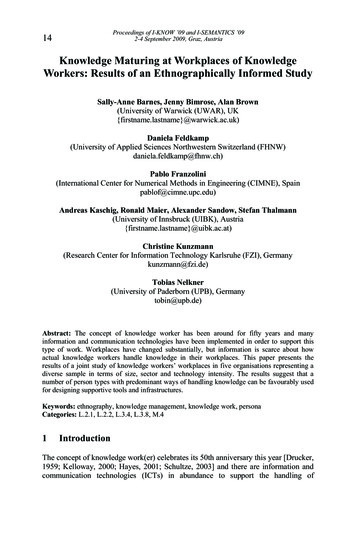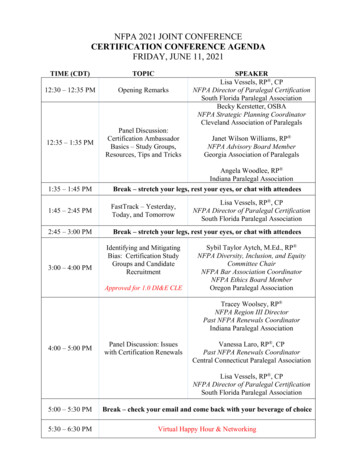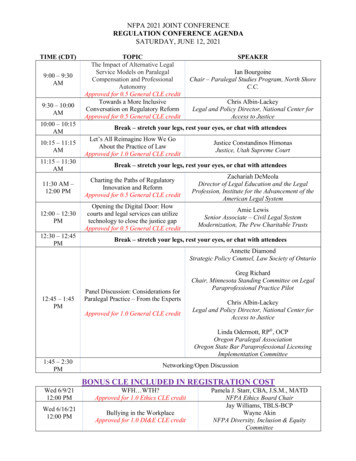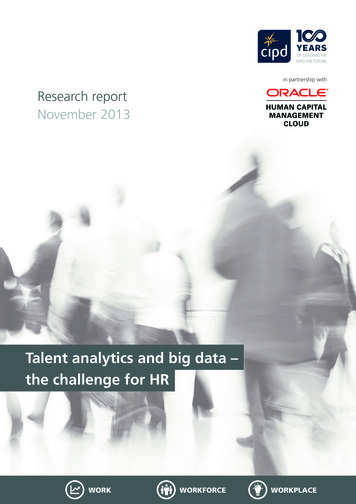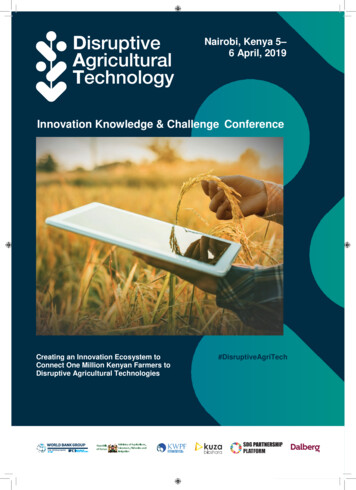
Transcription
Nairobi, Kenya 5–6 April, 2019Innovation Knowledge & Challenge ConferenceCreating an Innovation Ecosystem toConnect One Million Kenyan Farmers toDisruptive Agricultural Technologies#DisruptiveAgriTech1
ContentsWelcome Remarks: Hon. Mwangi KiunjuriWelcome Remarks: Carlos Felipe JaramilloConference DescriptionAgendaSession DescriptionsPanelist Biographies356810122
Welcome Remarks: Hon. Mwangi KiunjuriThe Government of Kenya, in partnership with the World Bank Group, Korea World BankPartnership Facility (KWPF), and Kuza Biashara, welcomes you to Savannah Valley forthe Disruptive Agricultural Technology Challenge and Conference 2019.Kenya is beginning to ride a new wave of a technology revolution with skyrocketingcellular subscriptions (with 28.3M unique mobile subscribers, 60% penetration1).Today, Nairobi is the epicenter for technological innovation. Kenya’s 1 billion2 techhub is the home to hundreds of innovators, as well as global technology firms like IBM,Intel, and Microsoft. Our innovators are focusing their creative energies on challengesthat matter most to Kenyans; we believe that no challenge is more significant thanraising agricultural productivity and rural incomes. Whereas we have made progress inmodernizing agriculture in Kenya, however, we have not yet reached our full potential.To achieve this potential, we must do agriculture in a different way. The AgricultureTechnology (AgriTech) innovators today are disrupting the conventions in agriculture byproviding solutions to key constraints faced by farmers – financial, market information,data, and advisory services; therefore, supporting our farmers to leapfrog to new levelsof productivity, efficiency, competitiveness, and income, improve nutritional outcomesand enhance resilience to climate change. Thus, Kenya is at the forefront of technologydriven transformation for small and marginal farmers on the continent.The Agriculture Technology (AgriTech) revolution aligns well with the strategic objectivesof the Ministry of Agriculture, Livestock, Fisheries and Irrigation (MoALF&I) as it allowsus to create an enabling environment for agricultural development, increase productivityand output in the agricultural sector, improve market access and trade, and ultimatelyenhance national food security. The focus of these innovations has been smallholderagriculture which is in line with Kenya Vision 2030. Vision 2030 reiterates the importanceof transforming smallholder subsistence agriculture into an innovative, commerciallyoriented, and modern sector3. These AgriTech innovations can also help achieve thefirst flagship goal of Agricultural Sector Transformation and Growth Strategy (ASTGS)2019-2029, which aims to increase small-scale farmers income by targeting 1 millionfarmers4. Furthermore, the new-age innovators are attracting skilled youth to agriculturethus fulfilling Kenya’s Youth Agribusiness Strategy which is aimed at providing newopportunities for youth in agriculture5.1 GSMA intelligence THEMOBILE ECONOMY SUBSAHARAN AFRICA 2017.2 photo-gallery/3 Kenya Vision 2030.4 Agricultural SectorTransformation and GrowthStrategy (ASTGS) 2019-2029.5 http://extwprlegs1.fao.org/docs/pdf/ken171450.pdf6 htmlMoALF&I is already leveraging technology to make value chains more efficient andreduce risks. MoALF&I is working with the Ministry of Information, Communication,and Technology (ICT) to register all farmers in the country, a move that is expected toboost service delivery to smallholder farmers.6 MoALF&I is also working with the WorldBank on Kenya Climate Smart Agriculture Project (KCSAP) and National Agricultural andRural Inclusive Growth Project (NARIGP) to find ways to make market linkages moreeffective through digital tools. The Kenyan Government, together with the Swiss ReGroup, GIZ, World Bank and ILRI, is also implementing the Kenya Livestock InsuranceProgram (KLIP) since 2014. KLIP is an index-based livestock insurance program thatuses satellite technology to protect pastoralists in the remote, arid and droughtpronerangelands of Kenya from the impacts of extreme weather.Hence, the technology revolution has kickstarted well with contributions from all sectoractors. All it needs now is a scale-up to multiply the impact. At the conference, theMinistry of Agriculture, Livestock, Fisheries and Irrigation (MoALFI) along with the WorldBank Group will launch One Million Farmer Initiative. The One Million Farmer initiativeaims to impact the lives of one million farmers in Kenya by leveraging the potentialof disruptive technologies. To this end, the Conference will mobilize the agricultural3
ecosystem to discuss the potential of disruptive technologies in Kenya. Innovators willget an opportunity to present their ideas and join the One Million Farmer Initiative. Webelieve that this Conference will build the momentum to scale-up the innovations andagricultural technologies by providing a historic platform that brings together globalleaders, innovators, leading policymakers, development partners, and technologyexperts to discuss innovation for agricultural transformation in Kenya and beyond.The two-day conference will provide an interactive experience through: The Disruptive Agriculture Technologies (DAT) Challenge will bring together over 20inspiring innovators to pitch their Agritech solutions focused on smallholder farmersin Kenya6-panel discussions drawing together 30 experts in the Agritech field, covering awide variety of topics, such as productivity, access to financial services and datapolicy for disruptive agriculture technologiesThe panel discussions and DAT challenge will provide a platform for all innovationecosystem players to interact with one another, build a network of Agritech inNairobi, find synergies to collaborate and grow together, further channelizing theinvestments to scale-up their operations.I would like to close by highlighting that smallholder agriculture provides employmentto 75% of the population and 80% of food supplies, but has limited access to finance,inputs, markets, information, and other services. Technology innovations can overcomeall these challenges – but it won’t happen automatically. We need to combine innovation,investment and policy to harness the power of the technology revolution to benefitsmallholder farmers.I urge you all to engage in the dialogue, share thoughts and ideas on the futureof agriculture.Hon. Mwangi Kiunjuri, EGH, MGHCabinet Secretary, Ministry of Agriculture, Livestock, Fisheries and Irrigation4
Welcome Remarks: Carlos Felipe JaramilloI am pleased to welcome you all to the first ever Disruptive Agricultural TechnologyChallenge and Conference. At the World Bank Group, we are committed to endingextreme poverty and promoting shared prosperity.Agriculture and food systems play a central role in meeting these goals. We know thatAfrica will be home to 2 billion people by 2050; over the same period, the number ofKenyans will grow to 85 million. Kenya’s food production will therefore need to growby 75% by 2030 to keep up with the additional food demand. On the supply side,Africa’s agriculture and food business are projected to grow to 1 trillion dollars by2030. Accounting for input supply, logistics, processing, packaging, trade, retail andother off-farm activities within value chains, agriculture remains the largest employerin Africa, with several emerging jobs and entrepreneurship opportunities for engagingtechnologically savvy youth. Indeed, these trends offer a unique opportunity to createhigh-quality jobs all along the agri-food system, spur farmer-centered technologicalinnovation, and enhance agricultural productivity.In Kenya, agriculture is the main contributor to the attainment of two of the pillars of theGovernment’s Big 4 Agenda – manufacturing and food and nutrition security. The WorldBank is currently supporting Kenya’s food and nutrition security agenda through thefollowing projects: Climate Smart Agriculture (US 250 million), the National AgriculturalRural Inclusive Growth (US 200 million), the Regional Pastoral and Livelihoods Resilience(US 77 million), and two large-scale irrigation projects.Innovation in agriculture is, without doubt, an important tool to tackle food security, andraise overall productivity and profitability in the agriculture sector. The range of AgTechinnovations that can be employed to transform Kenya’s agriculture is both excitingand endless. This includes weather data analytics, drones and satellites-based remotesensing and imagery, precision agriculture, Internet-of-Things (IoT) applications utilizingsensors for soil, water, plant and animal diseases, and fintech solutions for farmers,among many others. Low-cost digital technology represents a vast untapped potentialfor farmers, investors, and entrepreneurs in Africa.Over the next two days, you will actively engage with each other on practical andactionable solutions to scale up innovations that have the potential to transformKenyan agriculture and the challenges faced by farmers. However, developing AgTechinnovations is not enough. Firstly, farmers need to be engaged and trained on how toeffectively adopt them. Secondly, investors need to back the innovators to scale up.Lastly, governments need to create the policy environment and infrastructure that willencourage the large-scale use of these disruptive innovations. Reaching one millionfarmers with disruptive AgTech innovations seems ambitious, but I have confidence thatthe innovators and all actors in this conference will provide useful insights on how toattain these targets.On behalf of the World Bank Group, I would like to congratulate all the finalists of theinnovation challenge. Their business ideas and plans will contribute to the transformationof Kenya’s agriculture, towards improved incomes for farmers, food security andjob creation. Let me thank the Government of Kenya, the Korea-World Bank GroupPartnership Facility, Kuza Biashara, Dalberg and many others who made this DisruptiveAgricultural Technology Challenge and Conference possible.Carlos Felipe JaramilloCountry Director, World Bank5
Conference DescriptionThe World Bank Group defines ‘Disruptive Agricultural Technologies (DATs)’ as digitaland non-digital innovations that enable farmers and agribusinesses to leapfrog; thus,increasing their productivity, efficiency, and competitiveness, facilitating access tomarkets, improving: nutritional outcomes and enhancing resilience to climate change.These agricultural technologies range from mobile apps to digital identities for farmersto solar applications for agriculture to portable agriculture devices to bio-fortified foods.Kenya’s agricultural sector has great potential to leverage disruptive innovations toachieve agricultural transformation. Kenya is the innovation hub of Africa – approximately30 percent of Agri-tech start-ups in the continent are operating in Kenya1. This newgenre of DAT startups/innovators is thriving as they recognize unique local contexts andare catering to an average Kenyan smallholder farmer, while simultaneously using theworld’s cutting-edge technologies.We believe that the timing for DATs to scale-up is ripe in Kenya. The World Bank Group’spreliminary assessment shows that the DATs are instrumental in solving the challengesfaced by farmers but are currently operating at a small scale. DATs have successfullypiloted their solutions and are considering to scale-up. Falling cost of technology as anindustry trend is further supporting the scale-up.Crucial to scaling-up is an innovation ecosystem – an environment that enablesinnovators to engage in iterative processes2. A vibrant innovation ecosystem is the onewhich systematically invests in knowledge, innovation, policies, capital and incubationin the country. Kenya already has a budding innovation ecosystem evident from thesudden surge in DATs in recent years. This existing system now needs to drive the scaleup of DATs.The overarching goal of DAT Challenge and Conference is to strengthen the existinginnovation ecosystem to allow DATs to seamlessly scale-up. Keeping this goal inperspective, the World Bank Group along with the Ministry of Agriculture, Livestock,Fisheries and Irrigation (MoALFI) and Korea-World Bank Partnership Facility is launchingOne Million Farmer Initiative. The initiative aims to develop a digital platform. The digitalplatform will bring together different disruptive technology innovators to offer an end-toend platform solution keeping farmer’s challenges as a focal point.To mobilize knowledge for the platform thinking, four themes have been identified namely- Agricultural Productivity; Market Linkage; Farmer Financial Inclusion; Data Analyticsand Intelligence. Along with these four themes, the discourse will include sessions topromote conducive policies and investment climate.To mobilize innovators who will join the platform as the ‘First cohort of innovators’, thechallenge will be organized around the four themes. The Challenge will see leadingDAT innovators pitch their strategies with the chance of receiving performance rewards,acceleration funding, incubation, mentoring and financial support to scale up theirinnovations in Kenya.Thus, the conference will lay the foundations for the innovations to scale up in Kenya byconnecting a million Kenyan farmers to disruptive agricultural technologies.1 20 percent headquarteredin the country; Source:Preliminary findings fromCTA/Dalberg report on“Digitalisation for Agriculture –Africa”, 2019.2 World Economic Forum,“Innovation with a Purpose”,2018.6
7
Agenda: Day One8.00–8.30Registration8.30–9.30Welcome RemarksWelcomed by: Prof. Hamadi Boga, PrincipalSecretary, Ministry of Agriculture,
06.04.2019 · Bank is currently supporting food and nutrition security agenda through the Kenya’s following projects: Climate Smart Agriculture (US 250 million), the National Agricultural Rural Inclusive Growth (US 200 million), the Regional Pastoral and Livelihoods Resilience (US 77 million), and two large-scale irrigation projects. Innovation in agriculture is, without doubt, an important tool to tackle .
